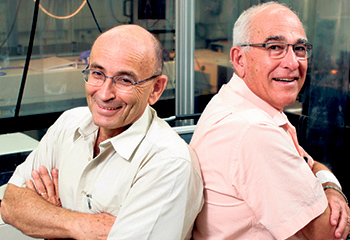A minimally invasive treatment for prostrate cancer from Israel that was partly developed in Montreal is showing a high cure rate in early stages of the disease with little to no side effects, its co-inventor said at a recent professional symposium at McGill University.
Biochemist Avigdor Scherz of the Weizmann Institute of Science said the drug Tookad Soluble, a registered trademark, has just been approved for prostate cancer therapy in Mexico, following successful phase III clinical trials in Latin America and Europe.
Tookad – from the Hebrew meaning the warmth of light – is a non-toxic, light-sensitive drug derived from chlorophyll. Tookad is injected into the patient and is activated when a laser light is shone into the targeted area using thin optic fibres inserted into the cancerous tissue.
The first-phase clinical trials began in Montreal a decade ago, through a collaboration between Scherz, of Weizmann’s plant and environmental sciences department, and urologist Dr. Mostafa Elhilali, then chief surgeon at the McGill University Health Centre.
Scherz presented the latest news on Tookad at the fifth McGill-Weizmann Symposium, held jointly in November by McGill’s Rosalind and Morris Goodman Cancer Research Centre and Weizmann’s M.D. Moross Institute for Cancer Research.
READ: GALA RAISES OVER $2 MILLION FOR MCGILL CANCER RESEARCH
Magnetic resonance imaging and biopsies confirmed that cancerous tissue was eliminated from the gland after treatment with Tookad in both the second and third-phase trials.
The patients’ continence and potency remained undiminished.
Tookad has been found to safely treat even large, deeply embedded cancerous tissue. The procedure lasts about 90 minutes, and Scherz said patients are released within a few hours. They can return to normal activities within a few days, and suffer none of the side effects often associated with radiotherapy or the surgical removal of the prostate.
The chlorophyll is synthesized from the pigment of certain aquatic bacteria that draw energy from sunlight. The drug, which is harmless, is totally cleared from the body three to four hours later.
Activated Tookad – near-infrared illumination is employed – produces short-lived oxygen and nitric oxide radicals, which quickly block and destroy blood vessels feeding the tumour.
Scherz said the effect is localized – the tumour is killed, while surrounding healthy tissue is spared.
The drug is being manufactured by Steba Biotech of Luxembourg, to which Weizmann’s technology transfer arm, Yeda Research and Development Company, has licensed the drug. Its medical use was approved by the Mexican government’s health regulatory body.
Scherz’s co-inventor is Prof. Yoram Salomon, a now-retired biochemical endocrinologist. Tookad is the fruit of their working nearly 20 years together.
READ: CANCER RESEARCHER SALUTED BY QUEBEC AND CANADA
In the third phase, Tookad was tested on 80 patients in Mexico, as well as Peru and Panama. Later, more than 400 patients in 43 hospitals in 11 European countries were involved.
The drug is currently being evaluated by the European Medicines Agency, the drug regulator in 27 countries.
Weizmann and Steba continue oncological research in collaboration with the Memorial Sloan Kettering Cancer Center in New York, including studies involving more advanced stages of prostate cancer.
Scherz credited Weizmann’s multidisciplinary environment for making the development of the novel drug possible. In their case it brought together the expertise of biology, chemistry and the plant sciences.
The two scientists are now also seeing if this photodynamic therapy can treat non-malignant eye diseases, including macular degeneration and myopia.
Scherz was one of 12 Weizmann scientists taking part in the biennial symposium, whose goal is to foster greater ties between the two research institutes.
